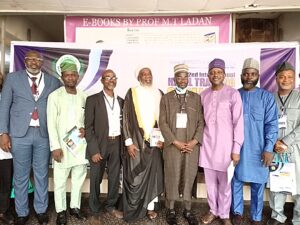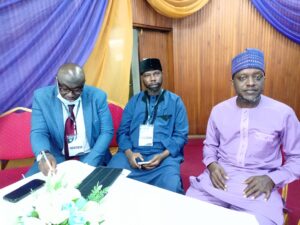The need for Small and Medium-size Enterprises (SMEs) in Nigeria to take advantage of the huge opportunities created by the emerging halal industry was put on the front burner on Tuesday, December 7, at the 2nd edition of the International Halal Seminar held in Lagos, Southwest, Nigeria.
The event, with the theme: “Emerging Halal Market: Tool for Economic Growth” was organised by the Halal Certification Authority (HCA) to educate the public on Halal and certification processes.
The seminar was attended physically and virtually by government agencies, captains of industries, manufacturing and service industries, academia, halal professionals, managers, students and all other stakeholders, both within and outside the country.
Some Muslims do not know the difference between Halal, non-Halal products – Prof. Oreagba
Speaking on the importance of the seminar, the Chairman of HCA, Professor Ibrahim Oreagba said Halal Certification Authority is primarily responsible for certifying products. It confirms that products, services and their processes are Halal.
“However, part of our responsibilities is also to enlighten the public about the halal industry. We realize that a lot of people do not even understand what halal is. Even some Muslims don’t know the difference between Halal and non- Halal products. So, it’s our duty to create awareness and this international seminar is one way of educating the public as well as our clients in the industry on Halal and certification processes.
Oreagba, a professor of Pharmacology and Toxicology at the University of Lagos noted that Halal, according to the Shari’ah is a term which means permissible, adding that it can also be referred to as wholesomeness, purity and healthy.
Speaking further, he said halal doesn’t refer only to food, it actually refers to a way of life.
“When you say halal, you’re referring to consuming what is pure and permissible. It also means what is clean. That is why when we certify Halal products, we first of all request that they have basic certifications before the halal team goes on to certify the products. When they get there, they also do an additional quality assurance before they now check for permissibility of the product.
Halal industry is an alternative source of income for Nigeria – Prof. Alaro
Erudite Islamic scholar, Prof. AbdulMajeed AbdurRazaq Alaro, while speaking on the theme, noted that the halal industry – which includes foods, non-food products and services is another alternative source of income for Nigerians as a nation with a huge market of about 5 trillion dollars share globally
He said, “When we look at it from pure economic perspective, the Halal industry is needed in Nigeria. We all know that the mainstay of our economy as a nation as we speak is oil and the whole world today is already planning for life after oil, even those that have bigger and better capacities in terms of oil reserves and capacity to produce and market. They are already looking for what comes after the oil exploration and production as the mainstay of their economies.

“So, when we look at it from that angle, we don’t have to close our eyes to other alternative sources of income for us as a nation. So, the Halal industry will provide one of the many alternatives that are available. It is a very big market today, we are talking of a market that has a share of about 5 trillion dollars globally. Hence, it is better for us to look at that direction too by way of diversifying our sources of income as a nation to continue to grow our economy and to continue to develop our country.”
Alaro, a Professor of Islamic Law at the University of Ilorin, Kwara State however, said that the Halal industry is currently at the elementary stage in Nigeria, with an insignificant market share.
According to him, “unfortunately, we are just beginning. When you look at what we can describe as the Halal industry report, hardly will you find anything referring to the status of halal marketing in Nigeria. This is because it is very insignificant if we look at the market share. Already, I told you the global worth of the market is about 5 trillion dollars, but we don’t even account for 1% of this market share globally.
“But, I believe it is a very good beginning. what we are doing here today is to create awareness for people to look at that direction. There is an ample opportunity that is waiting for us in that direction as a nation. We should just try to take that advantage.
“It is interesting when you look at the latest ranking of countries in the halal sector. Nigeria is not captured in most of the segments, just one. It is quite encouraging that Nigeria performed very well by coming 13th in the world in the Islamic financial sector. My interpretation is that if we can try to achieve our potentials in other sectors (segments) of the Halal economy, I believe we will improve our ranking and it will be very good for us as a nation, but as we speak, the market share is so insignificant in this country, Nigeria,” he noted.

Prof Alaro said despite the poor assessment of the industry in Nigeria, its good and services are accessible globally, with Brazil, a non-Muslim dominated country as the number 1 exporter of Halal foods industry.
“Others are India, United States of America, etc This is to tell you that the Halal industry is accessible to the entire world already, but it is quite unfortunate because Nigeria ought to have taken the advantage of having a very huge population of Muslims. That should be to our advantage and that is what we are calling for, but Halal production and services are already in every major economy of the world today. It’s not new and it is not strange,” he noted.
Muslim News reports that during the technical session that lasted for hours, papers addressing different related topics were presented by professionals.
While Malaysian scholar, Dr. Betania Kartika Muflih spoke on the Overview of the Halal Industry in Africa, her counterparts from Nigeria, Dr. Tajudeen Yusuf looked at Halal Finance: Opportunities for Nigerian Economic Growth.

On his part, the Director, Regulations and Compliance of the HCA, Nigeria, Alhaji AbdulAzeez Ajala did justice to the topic: Halal Certification: Prospects for AfCFTA implementation.
SMEs should key into the Halal product movement – Dr. Yusuf
Dr. Yusuf, an Associate Professor and the Founder, Institute of Islamic Finance Professionals called on Nigerians, particularly the SMEs to key into the Halal product movement that is taking over the whole world now.
According to him, When we talk about Halal financing for our products, it is meant to be a galvanizer and motivator for SMEs to go to any of the Halal financing outfits and negotiate for a profitable viable business deal. Banks are readily interested in financing Halal products and services and they will come with their financial muscles to support every SMEs. They are helping Nigeria as a country through Sukuk.
“So, it is a good development and an awesome one for SMEs to key into the Halal product movement that is taking over the whole world now. We thank Allah that we now have Islamic banks, Takaful, asset management companies, microfinance banks that are non-interest based. With time and more patronage, the prices of halal products will go down when we have more people coming on board to play their roles. It is a very huge field, very vast. It’s like an ocean, you just have to look at what area you can tap into.”
Speaking further, Dr. Yusuf said; “Halal companies don’t give loans, if at all they are going to give loans, it’s going to be interest-free, but these Halal outfits are just out to help those who are economically active but poor. The halal finance outfits are the best way to get funds, they won’t give them loans, but support their projects through any of the financing modes that we have; it could be Musharakah, equity, or Mudarabah (profit sharing), in which the banks see you as a partner.”
On the halal industry opportunities, the eloquent Islamic scholar said, “If you want to talk about development, you look at the SMEs, that’s the only way you can contribute. It creates jobs because your thoughts initially was ‘how do I get capital to drive idea, I have the idea, but I don’t have the capital’. Now, you don’t need to go and get the capital yourself, the Islamic outfits are there, you could go to a microfinance, cooperatives, Halal asset management, etc
“Once you have a very solid, verifiable, viable and feasible project, they will come to your aid, you don’t have to bother about it and you know when you build SMEs in any economy, you have grown the economy because the SMEs are the highest employers of labour in the country in any economy. So, once you support them with finance, the economy itself will grow,” he noted.
Growing awareness of Halal products is now of global dimension – Director, FIIRO
In a goodwill message, the Acting Director-General of Federal Institute of Industrial Research, Oshodi (FIIRO), Dr. Mrs. Agnes Yemisi Asagbra said the growing awareness of halal products is now of global dimension, saying the number of products and services which falls under the category of the Halal Industry is enormous.

Represented by Dr. Shakirudeen Ajani, Head, Packaging Technology Department, FIIRO, Dr. Asagbra, revealed that the growing interest in the potentials of the halal market has hastened the move towards the development of global halal standards, as well as expanded the coverage of halal standards to include activities such as logistics and packaging.
“All these makes FIIRO a strategic partner of the Halal Certification Authority, more importantly in the area of analysis of food and non-food samples to determine whether they meet halal standards or not”, he said.
NAFDAC Boss commends HCA
Deputy Director, Food System and Applied Nutrition, NAFDAC, Abdulsalam Ozigis, who spoke with Muslim News, described the gathering as inevitable going by the happenings in Africa.
Ozigis, who represented the Director General (DG) of Nigeria’s National Agency for Food and Drug Administration and Control (NAFDAC), Professor Mojisola Christiana Adeyeye said apart from the fact that HCA is determined to establish accreditation of halal system for products and services, it has also gone as far as seeing how far Nigeria has gone in Islamic finance, product halal, services halal and even extended to the discussions on how products and services that are halal certified and how they can compete in the African sphere in terms of African Free Trade Zone.
He expressed satisfaction over the success rate of the awareness created by Halal Certification Authority, describing it as amazing.
“We now have 5 halal certification bodies which was not possible 5 years ago and probably many more will come up. For now, the bodies will have to live up to their leadership needs because there are guiding principles.
“So, it’s an interesting session and we hope that many more people will understand halal better, that consumers will become more aware of what Halal is all about and understand how to identify halal services and products to make their informed choices,” he added.



